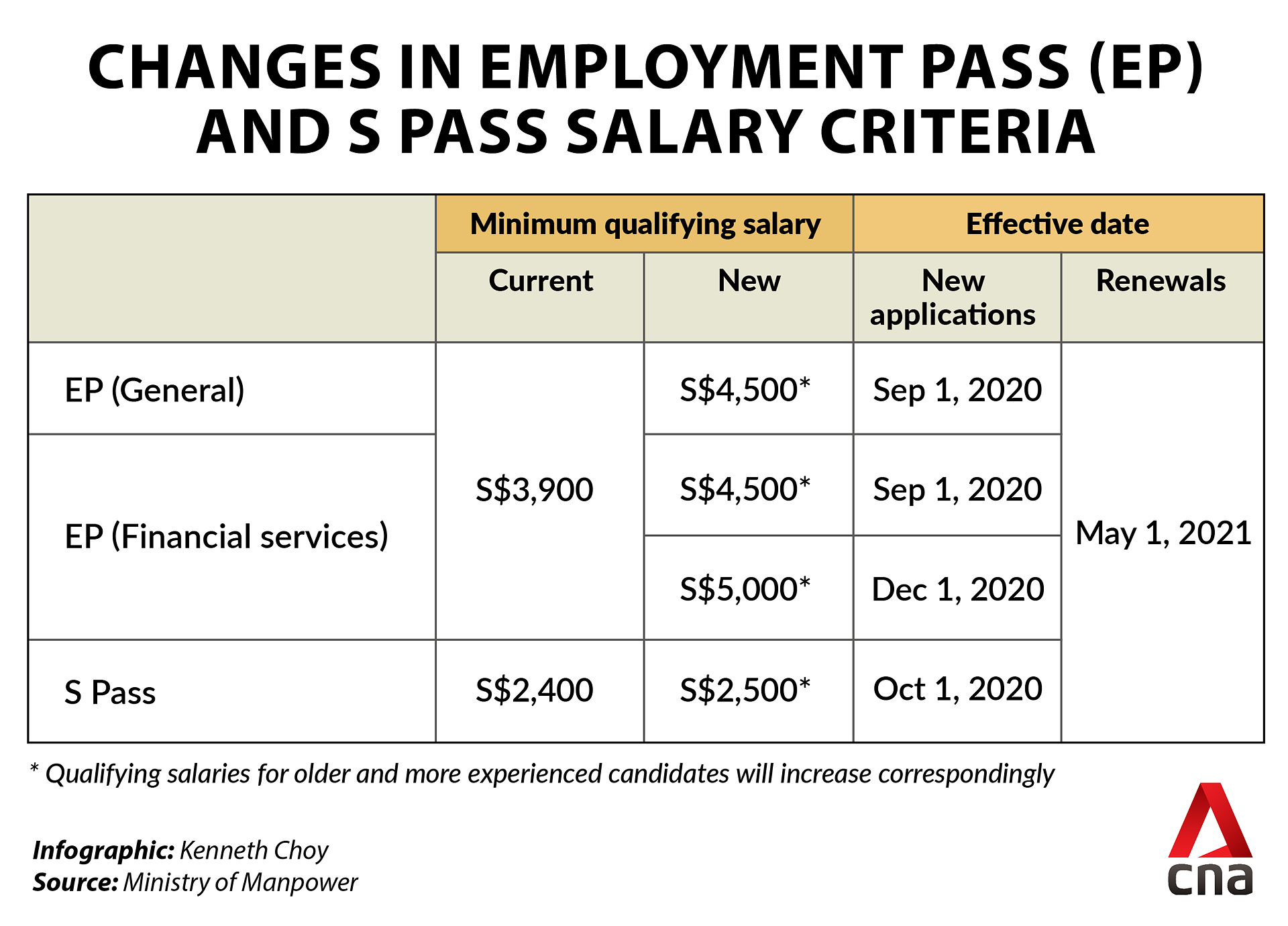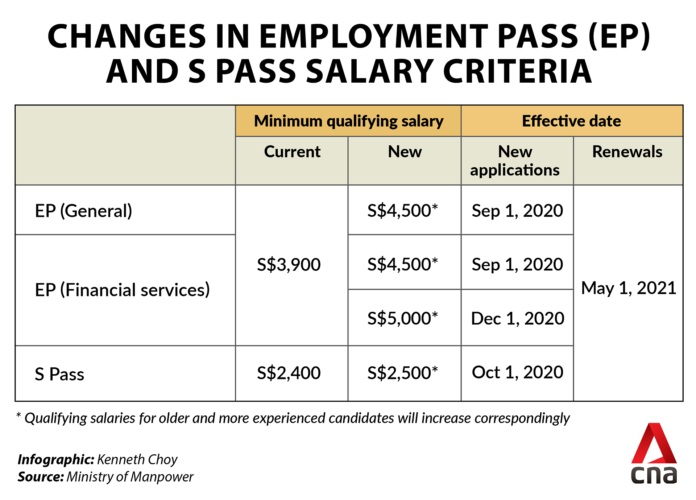SINGAPORE: The move to further raise the qualifying salary for S Pass holders has drawn concern from businesses owners in some industries, who said they sometimes have no choice but to turn to foreign workers as it is difficult to hire Singaporeans for certain positions.
Companies CNA spoke to said there are few locals in certain job roles not because of competition from foreigners, and that a blanket increase in the S Pass minimum salary will add to business costs when they are already struggling amid the current economic climate.
Some said other reforms have to be made if the aim is to attract Singaporeans to sectors like the food & beverage industry, retail and construction.
READ: Minimum qualifying salary to rise by S$600 for Employment Passes and S$100 for S Passes, higher requirement for financial services
The Ministry of Manpower (MOM) announced last Thursday (Aug 27) that the minimum qualifying salary for S Passes, which are for mid-skilled staff, will be raised by S$100 to S$2,500 from October. It is the second increase this year.
S Pass jobs will also be subject to the Fair Consideration Framework advertising requirement from October, in a bid to promote greater awareness of vacancies in mid-skilled jobs among local job seekers.
Employers will be required to post the advertisement for at least 28 days, up from 14.
MOM also announced an increase to the minimum qualifying salary of Employment Pass holders, which are for foreign professionals, managers and executives.

The Restaurant Association of Singapore said it cautions against the move to increase the salary criteria, noting that F&B operators are facing an “unprecedented loss of income” due to the COVID-19 pandemic and the need to implement safe distancing measures.
“Against this current backdrop, we caution against the recently announced move to increase salary requirements for Employment Passes and S-Passes for the F&B industry at this point in time,” it said in a Facebook post on Saturday.
The association added that it wants to engage government agencies to “deliberate further on the execution of this new salary requirements and launch alternative initiatives to encourage and excite more locals to see a career in F&B”.
ONE IN 10 APPLICANTS IS SINGAPOREAN
Mr Cedric Tang, owner of Ka Soh Chinese restaurants, said he prefers to hire Singaporeans but struggles to do so. For example, when he recently posted a job vacancy for service staff online, only one out of 10 applicants was Singaporean.
“We do get a lot of foreigners applying, that’s a given. I don’t think the F&B industry is the first industry (unemployed Singaporeans) are looking to join,” he said. “It’s a very manual job with shifts, whereas for an office job, you’re working from nine to six. It takes getting used to.”
He expects that he will have to raise the wages of some of his foreign workers when their work passes are renewed, but at the same time, it will be hard to increase menu prices in the current economic climate.
READ: Manpower Ministry to review companies whose ‘Singaporean core has been weakening’: Josephine Teo
Mr John Ng, CEO of fashion retailer StyleLab, told CNA that while he, too, tries to employ Singaporeans first, it can be challenging.
“It is an industry problem that all retailers encounter trying to recruit locals as the response and commitment are very poor,” he said.
Other sectors that Singaporeans may shun are those that are construction-related.
Mr Jason Law of SunPro Energies, which deals in solar solutions, said that raising the minimum qualifying salaries for foreign employees works only for jobs that are more attractive to Singaporeans, and not for jobs that locals do not want.
“Raising the minimum qualifying salaries will not improve the hiring opportunities of Singaporeans as they are not interested in these jobs in the first place,” he said.
“Raising the salary base may unnecessarily increase business costs and indirectly affect the local consumers as these costs increases may be passed on to them.”
A small proportion of the company’s workers are S Pass holders, he said.
READ: The Government will always be on the side of Singaporeans, says PM Lee amid job concerns
Despite the challenges, some bosses said they are trying other ways to attract Singaporeans to join their operations.
Mr Collin Ho, CEO of Collin’s Grille, said that it has always been a challenge to hire locals for roles such as chefs and restaurant service supervisors. He hopes more Singaporeans will consider a career in F&B
“We have been working closely with education institutions and actively engaging students to provide them a platform for internship and traineeship,” he said, calling on those making a mid-career switch to also consider the industry.
Mr Nicholas Quek, managing director of soundproofing company Noise Plaster, said that the change will not affect his company much as it employs only one S Pass holder who handles the technical design of windows.
“Generally, locals who are competent to do this job can easily develop themselves to find much higher-value employment within a few years. Thus, it is challenging to find an experienced candidate in this niche role,” he said.
“The best way to advance is to implement progressive business practices, strategy and use of technology to enhance the value of each position available in the company.”
READ: Singapore seeks ‘quality rather than quantity’: Chan Chun Sing on changes to foreign work pass policy
Fashion retailer Mr Ng added that the Government could perhaps offer “structured incentives” to locals if they accept jobs in industries like retail and F&B.
“I believe this would be a direct motivation to all locals,” he said.
“SMALL FRACTION” OF MID-SKILLED JOBS
Dr Kelvin Seah, senior lecturer from the Department of Economics at the National University of Singapore’s Faculty of Arts and Social Sciences said that mid-skilled jobs which Singaporeans shun remain a relatively small fraction of such jobs in Singapore.
“There are many mid-skilled jobs which Singaporeans would be happy to do if given the opportunity. And MOM’s move would benefit such individuals.
“This said, given the weak labour market conditions now, some Singaporeans may be open to taking up these jobs perhaps because they find themselves involuntarily unemployed,” he said.
He suggests that if the objective was to reduce foreign competition for mid-skilled jobs, the minimum qualifying salaries for S pass holders should be raised in tandem with the median gross monthly income of residents over time, instead of on an ad-hoc basis.
Mr Lee Quane, regional director (Asia) of ECA International, a global employment consultancy, said that MOM’s latest measure can be seen as a means of encouraging companies to recruit from the pool of unemployed Singapore residents before looking outside, by making it more expensive to hire foreigners.
“This may reduce potential unemployment amongst graduates and high school leavers who will be entering the employment market as it means that there may be less competition from overseas in the entry-level positions that may become available,” he said.
READ: MPs call for firms to be more transparent on foreign hiring, make push to prioritise Singaporeans
Mr Lee added that with the recent rise in unemployment levels, there will be more potential workers within Singapore for sectors like F&B. But as soon as the economy recovers, this group of new employees will likely exit these types of roles as they find jobs which are more attractive, unless the COVID-19 pandemic causes structural unemployment.
“If companies want to avoid relying on overseas workers to fill such jobs, they will need to invest in technology to increase productivity or automate certain roles,” Mr Lee said.
Following the announcement, Manpower Minister Josephine Teo said that the ministry always considers the impact to businesses with changes to work pass requirements.
She urged businesses to step up efforts to hire locals and consider schemes like the Jobs Growth Incentive and other training and attachment support programmes. She also asked companies to consider if they should update their recruitment practices or job design to better suit local candidates.
“You may of course adjust your EP or S Pass employees’ salaries upon renewal. But consider the missed opportunities of building up your local employment, and the strong government support to do so,” she said.
She emphasised in a speech in Parliament on Tuesday that MOM will place additional emphasis on whether an employer has kept up its support of local PMETs, for example, by looking at its record in handling retrenchment exercises.
“For example, is an EP or S Pass applicant a replacement for a local who was only recently retrenched? If so, MOM will ask why and turn down the application unless there are very good reasons,” she said.
“We will also place additional emphasis on whether the employer has been responsive to efforts by government agencies to help it recruit and train local PMETs.”





